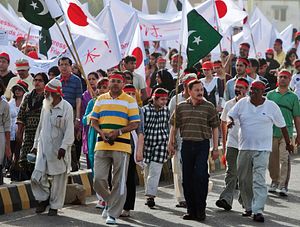Pakistan’s relations with Japan have drifted away in the past decade. In the past six years, there have been no high-level visits between the two countries. The last such exchange came in February 2011, when President Asif Ali Zardari paid a visit to Tokyo. Before that, Japanese Prime Minister Koizumi Junichiro visited Islamabad in April 2005.
For reasons unknown, the incumbent government of Prime Minister Nawaz Sharif has not tried to revive diplomatic momentum with Japan. In general, the government has not shown interest in its own ”Vision East Asia” policy, supposed to target outreach toward East Asian countries.
On the contrary, Indian Prime Minister Narendera Modi has deepened India’s ties with a number of East Asian countries, from Mongolia to Fiji. Pakistan’s foreign policy, however, remained inactive with East Asia, even though an active ”Go East” policy is the need of the hour in line with India’s ”Act East” policy. Pakistan’s foreign policy community has not broadened their focus beyond the country’s fundamental issues with India, Afghanistan, and the United States.
In the region of Southeast Asia, Prime Minister Nawaz Sharif has made only one visit, to Thailand in 2013. Other than China, East Asian countries are not on the diplomatic radar of the Sharif government, which is seemingly unaware that Japan, ASEAN, and South Korea are all important diplomatic and economic points for carving out a strong foreign policy in the region.
In the long run, Pakistan might pay a heavy price for neglecting East Asia. The Asia-Pacific is a highly crucial region in today’s international politics. Pakistani diplomats are not fully equipped to respond to increasing challenges in the South China Sea and the Asia-Pacific in general, even though the region is of vital importance to China, a close friend of Pakistan.
Japan used to be an important pillar of Pakistani diplomacy and economics. There was cordial diplomacy between Pakistan and Japan, starting right after Pakistan’s independence. Japan was a source of aspiration as Pakistan constructed it industry and economy in the 1950s and 1960s. Meanwhile, it was Pakistan that pleaded the case for postwar Japan, including early restoration of its sovereignty and economy. In one sense, Japanese post-war diplomacy in Asia began with Pakistan when they exchanged high-level visits in 1957.
Despite this rich history, at present, Japan’s economic activities in Pakistan are quite limited. Unlike China, Japan is not offering or participating in any national mega projects in Pakistan. Maybe for Japan, the situation is “not ripe” for business and investment in Pakistan “at the moment” — at least, these have been Japanese traditional pretexts for not doing business and investing in Pakistan.
It is true that Pakistan’s domestic situation, including apathy from government departments and terrorism, forced Japan to stay at bay for a long time. However, the situation has much improved now, including drastic changes in Pakistan’s economic fundamentals.
Today, the main issue might be the way China is welcomed in Pakistan, given Japan’s own tensions with its East Asian neighbor. Japan has historical differences with China and Pakistan has historically friendly ties with China. In the maritime dispute between China and Japan, Pakistan leans toward China; Japanese diplomats often grumble about this in private.
For Japan, the China-Pakistan Economic Corridor (CPEC) is a source of irritation; Japanese analysts argue that Chinese mega projects will not produce tangible results for Pakistan. There has been no official response from Japan on CPEC as of yet; the Japanese government is reluctant to give its opinion because of the growing enmity with China. CPEC offers huge investment and collaborative opportunities, but Japanese companies are disinclined to join in.
Enough business delegations have been exchanged between the two countries since 1948; it’s time to kick-start true mutual business. Japanese businessmen cannot move without the diplomatic green light from Tokyo, which has not yet come. Japanese businessmen, however, must realize that Pakistan is fast becoming a paradise for business and investment under CPEC and these vast opportunities should be grasped.
Instead, the official focus of Japan is on small-scale socio-economic projects mostly run by the NGOs in Pakistan. Japan offers small grants in order to show a token presence in Pakistan. Japan would be better served by participating in big national mega-projects such as railways, roads, tunnels, ports, and shipping. Japan could become a crucial partner of CPEC and enter Central Asian markets through Gwadar port.
Japan needs to work on a different strategy in Pakistan to enhance its role. Small scale NGO donation programs, and a tiny number of scholarships will not cement genuine people-to-people ties and a solid economic relationship between the two countries. These efforts have a long way to go. Out-of-the-box solutions are required, rather than the traditional strategy of moving slowly and gradually and containing China’s role in Pakistan.
Dr Ahmad Rashid Malik is a Senior Research Fellow at the Institute of Strategic Studies, Islamabad. He writes on China, Japan, and East Asian affairs.

































